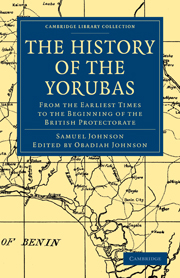Book contents
- Frontmatter
- AUTHOR'S PREFACE
- EDITOR'S PREFACE
- Contents
- 1 INTRODUCTION
- 2 THE YORUBA LANGUAGE
- 3 A SKETCH OF YORUBA GRAMMAR
- PART I THE PEOPLE, COUNTRY, AND THE LANGUAGE
- PART II
- CHAPTER I THE FOUNDERS OF THE YORUBA NATION
- CHAPTER II HISTORICAL KINGS
- CHAPTER III THE KINGS OF OYO IGBOHO
- CHAPTER IV A SUCCESSION OF DESPOTIC KINGS
- CHAPTER V BASORUN GAHA AND HIS ATROCITIES AND ABIODUN'S PEACEFUL REIGN
- CHAPTER VI THE REVOLUTION
- CHAPTER VII THE RISE OF THE FULANIS TO POWER
- CHAPTER VIII CONSEQUENCES OF THE REVOLUTION
- CHAPTER IX FURTHER DEVELOPMENT OF THE ANARCHY
- CHAPTER X SPREAD OF THE ANARCHY
- CHAPTER XI THE REVOLUTION IN THE EPO DISTRICTS
- CHAPTER XII WARS FOR THE CONSOLIDATION AND BALANCE OF POWER
- CHAPTER XIII THE LAST OF KATUNGA
- CHAPTER XIV THE INTERREGNUM
- CHAPTER XV THE NEW CITY, NEW GOVERNMENT, ILORIN CHECKED
- CHAPTER XVI FRATRICIDAL WARS
- CHAPTER XVII SUBJUGATION OF THE IJESAS AND EKITI'S SOCIAL REFORMS
- CHAPTER XVIII A GLORIOUS END AND A GORY DAWN OF TWO REIGNS
- CHAPTER XIX SEQUELS TO THE IJAYE WAR
- CHAPTER XX THE CLOSE AND THE OPENING CAREERS OF TWO HEROES
- CHAPTER XXI TWO ADMINISTRATIONS OF OPPOSITE POLICIES
- CHAPTER XXII A NEW REIGN AND EVIL PROGNOSTICATION
- CHAPTER XXIII THE COMMENCEMENT OF THE 16 YEARS' WAR
- CHAPTER XXIV CONFLICTS IN THE NORTH
- CHAPTER XXV IBADAN AT ITS EXTREMITY
- CHAPTER XXVI FAILURES AT RECONCILIATION
- CHAPTER XXVII A RIFT IN THE CLOUD
- CHAPTER XXVIII THE REV. J. B. WOOD AND THE A.O.K.
- CHAPTER XXIX THE INTERVENTION OF THE BRITISH GOVERNMENT
- CHAPTER XXX DISPERSAL OF THE COMBATANTS BY SPECIAL COMMISSIONERS
- CHAPTER XXXI DISTURBANCE IN EVERY PART OF THE COUNTRY
- CHAPTER XXXII ABORTIVE MEASURES TO TERMINATE THE WAR
- CHAPTER XXXIII THE DARK BEFORE THE DAWN
- CHAPTER XXXIV THE END OF THE WAR
- CHAPTER XXXV THE ESTABLISHMENT OF THE BRITISH PROTECTORATE. THE SEQUEL
- APPENDIX A TREATIES AND AGREEMENTS
- APPENDIX B
- INDEX
CHAPTER XXI - TWO ADMINISTRATIONS OF OPPOSITE POLICIES
Published online by Cambridge University Press: 05 July 2011
- Frontmatter
- AUTHOR'S PREFACE
- EDITOR'S PREFACE
- Contents
- 1 INTRODUCTION
- 2 THE YORUBA LANGUAGE
- 3 A SKETCH OF YORUBA GRAMMAR
- PART I THE PEOPLE, COUNTRY, AND THE LANGUAGE
- PART II
- CHAPTER I THE FOUNDERS OF THE YORUBA NATION
- CHAPTER II HISTORICAL KINGS
- CHAPTER III THE KINGS OF OYO IGBOHO
- CHAPTER IV A SUCCESSION OF DESPOTIC KINGS
- CHAPTER V BASORUN GAHA AND HIS ATROCITIES AND ABIODUN'S PEACEFUL REIGN
- CHAPTER VI THE REVOLUTION
- CHAPTER VII THE RISE OF THE FULANIS TO POWER
- CHAPTER VIII CONSEQUENCES OF THE REVOLUTION
- CHAPTER IX FURTHER DEVELOPMENT OF THE ANARCHY
- CHAPTER X SPREAD OF THE ANARCHY
- CHAPTER XI THE REVOLUTION IN THE EPO DISTRICTS
- CHAPTER XII WARS FOR THE CONSOLIDATION AND BALANCE OF POWER
- CHAPTER XIII THE LAST OF KATUNGA
- CHAPTER XIV THE INTERREGNUM
- CHAPTER XV THE NEW CITY, NEW GOVERNMENT, ILORIN CHECKED
- CHAPTER XVI FRATRICIDAL WARS
- CHAPTER XVII SUBJUGATION OF THE IJESAS AND EKITI'S SOCIAL REFORMS
- CHAPTER XVIII A GLORIOUS END AND A GORY DAWN OF TWO REIGNS
- CHAPTER XIX SEQUELS TO THE IJAYE WAR
- CHAPTER XX THE CLOSE AND THE OPENING CAREERS OF TWO HEROES
- CHAPTER XXI TWO ADMINISTRATIONS OF OPPOSITE POLICIES
- CHAPTER XXII A NEW REIGN AND EVIL PROGNOSTICATION
- CHAPTER XXIII THE COMMENCEMENT OF THE 16 YEARS' WAR
- CHAPTER XXIV CONFLICTS IN THE NORTH
- CHAPTER XXV IBADAN AT ITS EXTREMITY
- CHAPTER XXVI FAILURES AT RECONCILIATION
- CHAPTER XXVII A RIFT IN THE CLOUD
- CHAPTER XXVIII THE REV. J. B. WOOD AND THE A.O.K.
- CHAPTER XXIX THE INTERVENTION OF THE BRITISH GOVERNMENT
- CHAPTER XXX DISPERSAL OF THE COMBATANTS BY SPECIAL COMMISSIONERS
- CHAPTER XXXI DISTURBANCE IN EVERY PART OF THE COUNTRY
- CHAPTER XXXII ABORTIVE MEASURES TO TERMINATE THE WAR
- CHAPTER XXXIII THE DARK BEFORE THE DAWN
- CHAPTER XXXIV THE END OF THE WAR
- CHAPTER XXXV THE ESTABLISHMENT OF THE BRITISH PROTECTORATE. THE SEQUEL
- APPENDIX A TREATIES AND AGREEMENTS
- APPENDIX B
- INDEX
Summary
OROWÙSI'S ADMINISTRATION
Ibadan was the one place that loomed largely in people's eyes at this period (1870). To have taken Ilesa was regarded as a feat of extraordinary magnitude it being a town of great strength, both in its fortifications and in its able-bodied citizens; and consequently the eyes of all surrounding tribes were fixed on the town situated on the hills.
The first duty of the Ibadans now was to fill up the vacancies among the ruling chiefs and to settle home affairs.
They had only been at home for less than two months when on the 1st of September the town had to lament the death of Osun, the first-born son of Ogunmola the late Basorun. It was a great loss to the community, as the late Basorun had only two sons and a daughter. The town went into mourning for a month, and then arrangements were made to confer the title of Bale on Orowùsi. On the 30th September Agbarò the Ilari sent by the Alâfin for the purpose conferred the title on him in the presence of all the chiefs and a large assemblage of people.
On the 5th day after, the Bale began to confer the principal titles by batches; the most important of which we need mention are:—Ajobo who became the Balogun, Latosisà the Otun, Ajayi Ogboriefon the Osi, Ali Laluwoye the Asipa, Lawoyin the Seriki, Ojo Oroñna the Otun Seriki, Tajo the Otun Bale.
- Type
- Chapter
- Information
- The History of the YorubasFrom the Earliest Times to the Beginning of the British Protectorate, pp. 383 - 395Publisher: Cambridge University PressPrint publication year: 2010First published in: 1921



